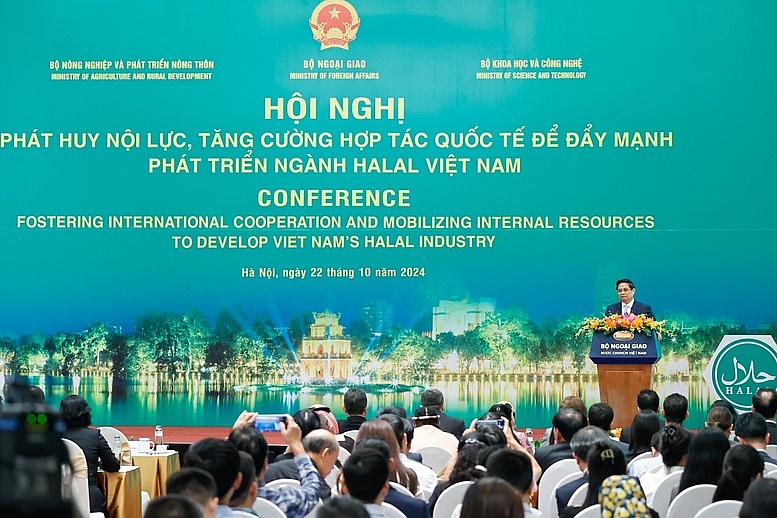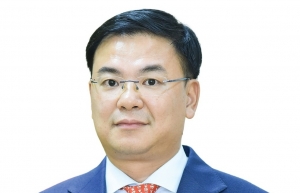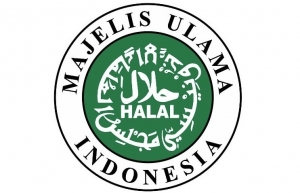Vietnam aims to become global halal food supplier
On October 22, the Ministry of Foreign Affairs, in collaboration with the Ministry of Science and Technology (MoST) and the Ministry of Agriculture and Rural Development, co-hosted a conference themed "Fostering International Cooperation and Mobilising Internal Resources to Develop Vietnam’s Halal Industry" at the National Convention Centre.
 |
| Prime Minister Pham Minh Chinh giving speech at the conference. Photo: VGP/Nhat Bac |
The event marked a strategic direction for the development of Vietnam’s halal industry, aiming to make the country a vital destination on the global halal map.
The halal sector encompasses products that are "permissible" or "lawful" for use under Islamic law, requiring strict compliance in terms of ingredients, production processes, and transportation.
Yousif S. Alharbi, vice president of the Saudi Arabia Halal Centre under the Food and Drug Authority, stated at the conference, "The requirements for Halal products, such as purity, ethical standards, and harmony with nature, are values deeply ingrained in Vietnamese culture. This presents an opportunity for Vietnamese businesses to integrate Halal standards into their agricultural and seafood export products."
"Vietnam is emerging as a crucial link in the global Halal supply chain and could become a hub for the production and distribution of Halal products to this market," he added.
Sharing this view, Mohamed Jinna, chairman of the Indian Halal Certification Authority, noted that Vietnam stands on the verge of a promising future, as it approaches a rapidly expanding global halal market. Halal certification, he said, will be the gateway for Vietnam to access a market that spans various industries, including food, pharmaceuticals, cosmetics, fashion, and tourism.
"Vietnam is at a golden moment to seize the opportunity to participate in this market, which is valued at over $7 trillion and is projected to grow to $10 trillion by 2030, driven by increasing consumption of Halal products in Muslim-majority countries and even in non-Muslim countries," Jinna said.
The halal certification referred to by Jinna is the standard that the Ministry of Science and Technology is currently applying to domestic businesses to meet the strict demands of the international market.
Huynh Thanh Dat, Minister of Science and Technology, emphasised, "Vietnam’s halal certification capacity is built on a solid foundation of science and technology to research and develop high-quality halal products. We will continue to work with international partners to standardise production processes and enhance Vietnam's Halal certification capabilities."
Speaking at the conference, Prime Minister Pham Minh Chinh expressed Vietnam's desire to make halal a leading industry, serving as a key economic cooperation pillar and a new driver in strengthening relations with other countries, including the global Muslim community.
"Vietnam views halal as a golden opportunity for its businesses to enhance their production capacity and effectively engage in the global halal market. In this context, the sector’s development will be based on respecting cultural values, especially human values and the principles of peaceful coexistence. It reflects Vietnam's contribution and responsibility in building a peaceful, diverse, harmonious, and developing world," Chinh said.
PM Chinh identified three key pillars for Vietnam’s halal industry development. First, Vietnam’s political and social stability, along with its growing economic and population scale, make it an attractive destination. The country ranks 34th globally in terms of economic size, is among the top 20 trading nations, and is currently benefiting from a demographic dividend with a population of 100 million people.
Second, Vietnam's expanding international relations and economic ties provide a strong foundation. The country maintains diplomatic relations with 194 nations, has strategic partnerships with 32 countries, and is a member of more than 70 regional and international organisations. Vietnam also enjoys strong cooperation with the global Muslim community.
Third, Vietnam’s geographical advantages and natural conditions position it well to participate deeply in Halal supply chains, benefiting from its experience in ensuring global food security. The country produces many agricultural products that meet Halal standards and has significant potential in tourism, including Halal tourism, with its long coastline and diverse ecosystems.
To capitalise on domestic strengths and enhance international cooperation in the halal sector, Chinh outlined five areas of focus. They included promoting information sharing and experience exchange, fostering negotiations and agreements on cooperation and mutual recognition of halal certification, encouraging regional and international partners to invest and do business in Vietnam, advancing the promotion of Vietnamese halal products, services, and brands, and facilitating cultural exchange and understanding between people to foster mutual growth.
 | MoFA accelerating efforts in promoting the halal industry Vietnam is now developing its halal industry, which boasts great potential. Deputy Minister of Foreign Affairs Pham Quang Hieu spoke to VIR’s Thanh Dat about how the industry will be fostered, and how opportunities for businesses will be realised. |
 | Vietnam determined to tap into thriving Halal market Vietnam is sharpening its strategic approach to the Halal market, actively pursuing stronger partnerships with Indonesia and ASEAN nations to capitalise on the expanding industry. |
 | Halal markets offer export opportunities for Vietnamese produce The global market currently has high demand for Halal products, especially agricultural products, offering an opportunity for Vietnam to tap into this promising segment. |
What the stars mean:
★ Poor ★ ★ Promising ★★★ Good ★★★★ Very good ★★★★★ Exceptional
Related Contents
Latest News
More News
- Agentic AI set to reshape Vietnam’s enterprise landscape (February 10, 2026 | 12:06)
- Agro-forestry and fisheries exports jump nearly 30 per cent in January (February 09, 2026 | 17:45)
- Canada trade minister to visit Vietnam and Singapore (February 09, 2026 | 17:37)
- New tax incentives to benefit startups and SMEs (February 09, 2026 | 17:27)
- Vietnam forest protection initiative launched (February 07, 2026 | 09:00)
- China buys $1.5bn of Vietnam farm produce in early 2026 (February 06, 2026 | 20:00)
- Vietnam-South Africa strategic partnership boosts business links (February 06, 2026 | 13:28)
- Mondelez Kinh Do renews the spirit of togetherness (February 06, 2026 | 09:35)
- Seafood exports rise in January (February 05, 2026 | 17:31)
- Accelerating digitalisation of air traffic services in Vietnam (February 05, 2026 | 17:30)

 Tag:
Tag:















 Mobile Version
Mobile Version